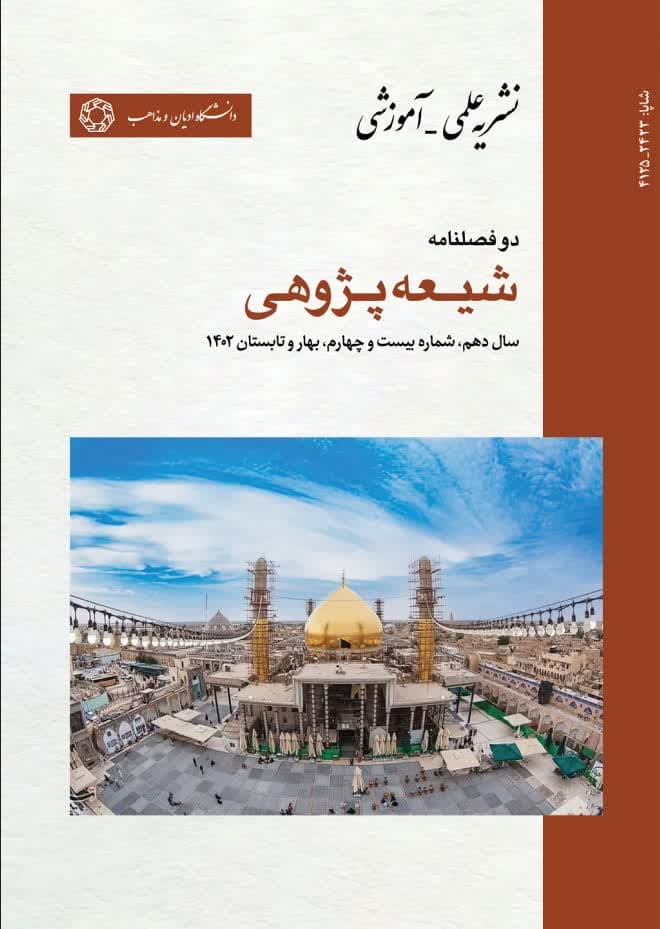بسماللهالرحمنالرحیم
Article title: Imam’s Unseen Knowledge from the Perspective of Cerse and Hadiths: Review and Criticism of Abolfazl Borgheri’s View
عنوان مقاله: علم غیب امام از منظر آیات و روایات؛ بررسی و نقد دیدگاه ابوالفضل برقعی
نویسنده (نویسندگان): مجید کیانینژاد، محمّد حسن نادم، اکبر باقری
Abstract:
Abolfazl Borghei is one of the prominent people among the revisionists of Shia beliefs. Based on some of the Quranic verses, he denies the unseen knowledge of the Imams (AS). He introduces the belief of today’s Shia concerning the Imams’ (AS) knowledge of the unseen as extravagant and out of correct tenets. According to the research conducted on Borghei’s views and the origin of his beliefs in a descriptive and analytical method, it seems he believes that the unseen knowledge of Prophets and Imams (AS) requires communication with the origin of the unseen knowledge (God) through revelation. Since revelation in its special sense is also exclusive to divine prophets, other than them, including the Imams of Ahl al-Bayt (AS) or other divine saints, due to not having this channel of communication, they are incapable of attaining the knowledge of the unseen. Explaining the concept of “unseen” based on everything that is hidden to man in terms of time, place, and the possibility of perception, this research brought up the verses and interpretative hadiths related to the exclusiveness of the unseen knowledge to God and its negation of the prophets (AS). Also, considering the conceptual difference between “revelation” and “inspiration”, the ways of attaining divine knowledge were pointed out, and the identification of the unseen with receiving revelation was questioned. As a result, it became clear that God has introduced other ways such as inspiration to reach the unseen. This way is not exclusive to the prophets (AS), so other divine saints can also gain knowledge of the unseen through this channel. Many unseen narrations from the Imams (AS) included in the hadith and historical sources of Shia and Sunni confirm this conclusion.
چکیده:
ابوالفضل برقعی از افراد شاخص در جریان طالب تجدید نظر در عقاید شیعی است. وی با استناد به پارهای از آیات قرآن، علم غیب ائمه (ع) را نفی میکند. برقعی عقیده شیعه امروزین به علم غیب دانستن ائمه اهل بیت (ع) را باوری غالیانه و خارج از عقاید صحیح معرفی میکند. بر اساس پژوهش صورتگرفته در بررسی آرای برقعی و سرمنشأ باورداشتهای وی به روش توصیفیتحلیلی، چنین به نظر میرسد که برقعی لازمه غیبدانی پیامبران و امامان (ع) (غیرخداوند) را اتصال به منشأ علم غیب (خداوند) از طریق وحی میداند. از آنجا که وحی به معنای خاص آن نیز در انحصار انبیای الاهی است، غیر ایشان، اعم از ائمه اهل بیت (ع) یا سایر اولیای الاهی، به علت نداشتن این مجرای ارتباطی، از دستیافتن به علم غیب ناتواناند. در این پژوهش، ضمن تبیین مفهوم «غیب» بر هر آنچه از نظر زمان، مکان و امکان ادراک بر انسان پوشیده است، آیات و احادیث تفسیری مربوط به انحصار علم غیب بر خدا و نفی علم غیب از پیامبران (ع) مطرح، و برآیند کلی مضامین مربوط بررسی شد. همچنین، با توجه به تفاوت مفهومی «وحی» و «الهام» به راههای دستیابی به علم الاهی اشاره شد و یکسانانگاری غیب با دریافت وحی در معرض پرسش قرار گرفت و مشخص شد خداوند طرق دیگری همچون الهام را نیز برای دستیابی به غیب معرفی کرده است. این طریق در انحصار انبیا (ع) نیست و سایر اولیای الاهی هم میتوانند از این مجرا به علم غیب دست یابند. اخبار متعدد غیبی ائمه (ع) مندرج در منابع حدیثی و تاریخی فریقین مؤید این نتیجه است.
Keywords: Seyyed Abolfazl Borghei, Imam’s Unseen Knowledge, Revelation, Inspiration, Verses and Hadiths
کلیدواژهها: سید ابوالفضل برقعی، علم غیب امام، وحی، الهام، آیات و روایات
*********


